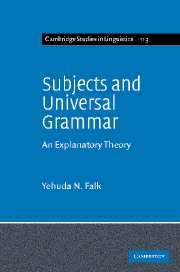4 - Long-distance dependencies
Published online by Cambridge University Press: 22 September 2009
Summary
About long-distance dependencies
In this chapter, we will discuss the nature of long-distance dependency constructions (also known as unbounded dependencies, extraction, wh-movement, and Ā dependencies) and their interaction with subjecthood. We will see that the theory of pivots proposed in the previous chapter, combined with certain formal aspects of LFG, explains the special status of subjects in long-distance dependencies. In doing so, we will need to delve a little deeper into technical aspects of the LFG formalism.
Despite the image long-distance dependency constructions have as the epitome of the structure-dependent construction, it has long been known that subjecthood is relevant to long-distance dependency constructions. The fact that extraction of subjects is different from other types of extraction can be shown in many ways. For example, in many languages, only subjects (pivs) can extract (Keenan and Comrie 1977) and subjects are often resistant to being resumptive pronouns (Keenan 1976). Subjects and non-subjects behave differently in across-the-board extraction. In English, matrix subject questions do not require do support. Subject extraction has been shown experimentally to involve a lower processing load than non-subject extraction (see references in Hawkins 1999). Paradoxically, subjects also sometimes appear to be harder to extract, as in the case of the infamous that-trace effect. The formal analysis of long-distance dependency constructions should allow for an elegant account of facts of this kind. In this section, we will examine the LFG analysis of long-distance dependencies and its interaction with the theory of subjecthood being developed here.
- Type
- Chapter
- Information
- Subjects and Universal GrammarAn Explanatory Theory, pp. 106 - 134Publisher: Cambridge University PressPrint publication year: 2006



